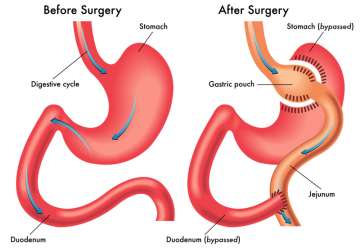Gastric Bypass Surgery
Find your care
Our bariatric surgeons use a range of treatments to help you reach weight loss goals and optimize your health. To learn more, call 310-206-0367.
Patient Stories
At the UCLA Center for Obesity and METabolic (COMET) Health, we are actively conquering the obesity epidemic through research and advanced surgical treatments, including gastric bypass and sleeve gastrectomy surgery. Here, we understand that obesity is not simply a weight problem, but a chronic condition affecting your entire body. Our team of experts offers award-winning care and the support you need to successfully manage and overcome obesity and its related health problems.
What is Gastric Bypass Surgery?

Gastric Bypass Surgery
Gastric bypass surgery is a type of bariatric, or weight loss, surgery. During gastric bypass surgery, your physician makes changes to your stomach and small intestine to change the way they absorb and digest food.
Gastric bypass aids weight loss by:
- Restricting the amount of food that your stomach holds
- Limiting the amount of calories and nutrients your body absorbs
- Changing your gut hormones, which help you feel fuller longer, contribute to appetite suppression and the reversal of obesity-caused metabolic syndrome.
What is Roux-en-Y Gastric Bypass?
Roux-en-Y Gastric Bypass Surgery
Roux-en-Y gastric bypass is considered the ‘gold standard’ of weight loss surgery. It is the most commonly performed bariatric procedure worldwide. During Roux-en-Y gastric bypass surgery, your surgeon:
- Makes a small stomach pouch – about the size of an egg – by dividing the top of the stomach from the rest of the stomach.
- Then, the small intestine is divided, and the bottom end of the divided small intestine is brought up and connected to the newly created small stomach pouch.
- In the end, the top portion of the divided small intestine is connected to the small intestine further down so that the stomach acids and digestive enzymes from the bypassed stomach and first portion of your small intestine will eventually mix with the food.
Is Gastric Bypass Surgery Right For Me?
Gastric bypass surgery’s advantages include:
- Very good short term weight loss (60 to 80 percent excess weight loss)
- Lasting, long term results. The data show that up to 20 years after surgery, most patients maintain more than 50 percent of their excess weight loss.
- Excellent resolution of obesity-related health problems
At UCLA, we offer information seminars twice a month with our specialists to help you determine if gastric bypass surgery is right for you. While it has many benefits, disadvantages may include:
- The long term complication rate is slightly higher than sleeve gastrectomy. Complications can be avoided with proper care, however.
- Patients are not allowed to take aspirin or other NSAIDS after surgery.
- All patients need to take vitamins for life after surgery. If they don’t, it could lead to long-term vitamin/mineral deficiencies, particularly deficits in vitamin B12, iron, calcium and folate.
Learn more about other effective weight loss treatments at UCLA and how to get started on your road to health.
Gastric Bypass at University of California, Los Angeles (UCLA)
We perform the Roux-en-Y technique for gastric bypass surgery laparoscopically, which means a shorter hospital stay, recovery time and less pain and scarring for you. Our surgeons are nationally known for their great outcomes, skill and expertise. Our program also features:
- Low complication rates: Our surgeons have pioneered a new technique called the UCLA U-loop, a special way to perform these surgeries that lowers complication rates.
- Extensive follow-up care: We work hand in hand with your primary care physician to manage all aspects of your postoperative care, and all of our services are available to you on a 24/7 basis.
- Comprehensive, multidisciplinary care: Our COMET team features top surgical and disease specialists and dietitians – all working together to provide you with the best care possible.
- Patient support: We offer support groups for our patients both before and after surgery.
- Award-winning care: We have been designated as an MBSAQIP Accredited – Comprehensive Center with Adolescent. We are also ranked among the best hospitals in the nation and as the No. 1 hospital in California by U.S. News & World Report.
Learn more about UCLA Bariatric Surgery in Los Angeles, California
What Can I Expect After Gastric Bypass Surgery?
For the first month, you will only be able to handle small amounts of soft food and liquids. But gradually, you will be able to add solid foods back into your diet. You will notice feeling full very quickly – after eating about two tablespoons of food. Your physician may also recommend that you take nutritional supplements.
Within the first two years, you can expect to lose one-half to two-thirds of your excess body weight. Weight loss will continue, in most cases, for a year and a half before stabilizing. At UCLA, our specialists will work with both you and your primary care physician to make sure your recovery is as smooth as possible.
Contact Us
To schedule a consultation with UCLA Bariatric Surgery in Los Angeles, California, call us at or fill out our .
For a physician referral, please call.
*Weight loss results can vary depending on the individual. There is no guarantee of specific results. Read full disclaimer.